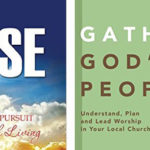In Search of a Confident Faith: Overcoming Barriers to Trusting God by J.P. Moreland & Klaus Issler (InterVarsity)
This is an excellent book, written by two college professors, but it doesn’t have the feel of one written by scholars. While their research and scholarship are evident, the book is neither dry nor difficult to read.
One of the most thought-provoking truths presented is “faith” has been given a label by mainstream society that compares it to wishful thinking. As the authors point out, faith is anything but blind. It has a bedrock foundation in the truth that God is trustworthy and capable of doing anything God wills.
As the authors point out, even Christians can hear of blind faith often enough that we begin to speak of just “taking things on faith.” And that is fine as long as we remain cognizant of just how wonderful a thing that is.
When we take things on faith, we do not lean on something we don’t understand but stand firmly on the ways that God has shown himself to be worthy of faith throughout history. We have faith in God because he is trustworthy. We have faith in God because nothing is outside his power. And perhaps, most of all, we have faith in God because he has proven over and over again the depths of his love for us.
The first half of the book is spent addressing challenges to faith, and the second half is about putting faith to practice in our lives.
This is no light treatment but a balanced look at “God-confidence,” as the authors replace the slandered word “faith.” It made me examine facets of faith I had not studied before.
I was challenged by this book, and I like where God is leading me through it.
George Henson
Sign up for our weekly edition and get all our headlines in your inbox on Thursdays
Staff writer, Baptist Standard, Dallas
Great Prayers of the Old Testament by Walter Brueggemann (Westminster John Knox Press)

|
In every culture throughout human history, people have prayed. But the manner in which they pray depends upon the deity they address. Old Testament scholar Walter Brueggemann reminds readers that people in the Hebrew Scriptures specifically prayed to the God of the exodus, whom they knew as Creator of all and as the One who made covenant with Israel.
Brueggemann, professor emeritus of Old Testament at Columbia Theological Seminary, in Decatur, Ga., spotlights a dozen Old Testament prayers, examining both the meaning of the prayers and the lives of the prayers.
He rightly makes the point that the people of Israel felt no constraints of theological categories. Rather than worrying about questions of open or closed theism, they prayed with the simple expectation that their prayers could make an impact on God. They prayed anticipating—sometimes even demanding—an answer.
Their prayers were an ongoing, interactive dialogue with God, and they fully expected God to keep up his end of the conversation. And they prayed with refreshing honesty and candor, sometimes in ways that seem almost scandalous to 21st century Christians.
While the book is slim, at fewer than 150 pages, it is thick and rich with thought-provoking insights.
Ken Camp
Managing editor, Baptist Standard, Dallas
The Future of Faith in American Politics: The Public Witness of the Evangelical Center by David Gushee (Baylor University Press)

|
When many Americans think of evangelicals and politics, they often think of the “religious right” or possibly the “religious left.” Ethicist David Gushee makes a reasoned case for a movement toward an already existing and growing “evangelical center” as a valid biblical path for Christians in the midst of a polarizing political culture. Focusing on the key issues of torture and human rights, marriage and the law, evangelicals and war, and creation care and climate-change, Gushee discusses how such important topics can be addressed by the evangelical center and lead to interaction with the public sphere.
Even though Gushee promotes a “centrist” view in the political arena where we may find we are to be conservative on some issues and progressive on others, in the end, he writes that Christians must not give in to the temptation to ultimately define themselves by political categories but instead through the gospel.
Rather than engaging ourselves in damaging “culture wars,” followers of Jesus Christ can find common ground with others, yet also speak truth that neither the political right nor the political left seems willing to speak.
Greg Bowman
Minister to students, First Baptist Church
Duncanville














We seek to connect God’s story and God’s people around the world. To learn more about God’s story, click here.
Send comments and feedback to Eric Black, our editor. For comments to be published, please specify “letter to the editor.” Maximum length for publication is 300 words.